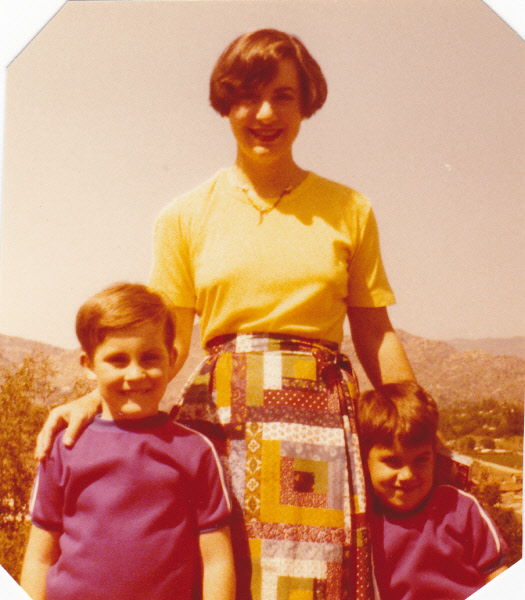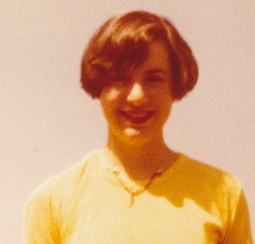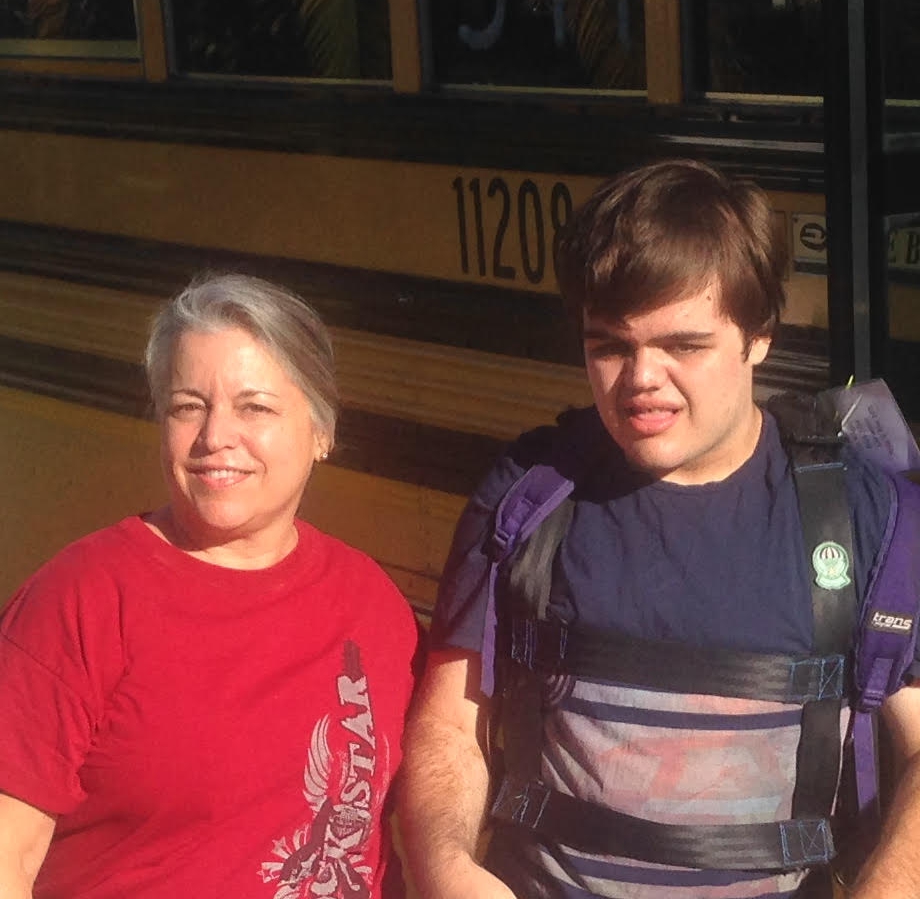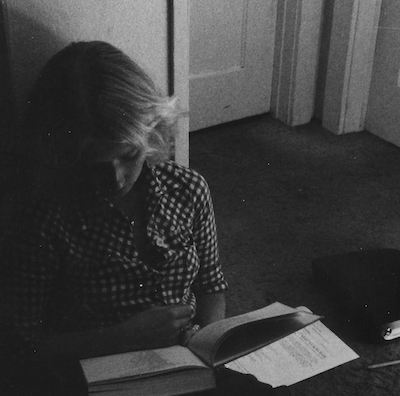The elevator comes and goes, comes and goes. I stand in a stupor, oblivious to the whooshing of doors opening and closing. Mundane functions like getting into an elevator seem irrevocably unimportant while my thoughts jump radically between believing and disbelieving what I’ve just been told.
A few minutes before I’d stumbled out of my gynecologist’s office, a place I know intimately. It is there – that harbor of long hypodermic needles and cold instruments – where I hear the improbable which this very moment has become a terrible reality.
A receptionist who works nearby steps from her desk inquiring if I’m OK. It’s only then that I realize tears have soaked the front of my beige silk blouse, its bow tie limp from the dampness. I mumble something as she leads me to a chair. Then she calls a security guard to help me to my car.
Once there, the pretense of trying to keep myself together vanishes. I put my forehead on the steering wheel and sob, my hands pounding uncontrollably against its unyielding indifference, indifference it shares with those humiliating stirrups attached to the examining table in every gynecologist’s office.
The tears stop, but the shaking continues. I dig in my purse for a tissue, but finding none I pull up my skirt and wipe my face on its lining, streaking my mascara. I try to calm myself by taking deep breaths, but it’s no use because my doctor’s voice is embedded in my brain.
To Dr. Stone’s credit, the injurious news is not tendered in a matter-of-fact pronouncement. His voice breaks, and he looks at me with a kind of softness to his normally professional face. I’m loosely in love with him – that transference thing shrinks always talk about. How could I not be? I’m 30 years old and have been married enough years that boredom lurks on the edge of my existence. I find Dr. Stone an arresting man with thick black hair and eyebrows that grow together over his prominent nose. To me, his mien is a sign of razor-sharp intelligence. I’ve known him for more than eight years, through excruciating infertility treatments, surgery, and the miracle birth of my son. You might say we have a feeling for one another, beyond the normal doctor-patient relationship – grown out of respect for our mutual failures and successes regarding my infertility.
I sit facing Dr. Stone. Usually our discussions take place after a pelvic in the exam room, but today I’ve been allowed into his inner sanctum where photos of his sophisticated-looking wife and graceful daughters in ballet pose adorn his antique desk. His demeanor is serious, and I’m suddenly nervous.
He looks through my chart and says, “Eight weeks ago, you came in because of a serious cough. Dr. Carmine examined you. You had a chest X-ray and you were told that you probably had bronchitis. Dr. Carmine gave you a prescription cough medicine. Did he ask you anything at that time?”
“Yes. He asked if I was pregnant. I told him I didn’t think so because I’d taken precautions.”
Dr. Stone looks directly at me. “What kind of precautions?”
“A contraceptive gel.”
He nods dismissively and continues, “You saw Dr. Carmine again four weeks later. Tell me about that visit.”
“I was concerned about my continual hacking and exhaustion. Dr. Carmine ordered another chest X-ray and gave me another prescription for the cough medicine. I had run out of it. He also asked me again if I was pregnant and I said I didn’t think so. Last week, I realized my period was late, and that’s when I called and you ordered the test.”
Dr. Stone looks down at his hands and then up at me. I hear a small sigh escape from this man I know so well and yet don’t know at all. My entire body tightens as if I could fend off what he is about to say. But that’s not possible.
“You’re pregnant and you need to have an abortion,” he says. That’s when his voice breaks as he continues, “Right away.”
The news is so impossible that I stare dumbly at Dr. Stone. I’m speechless. Finally, and with great effort, I say, “I don’t understand.”
My mind forages backward. Not all that long ago – at least it seemed that way – I had been in this same place and heard Dr. Stone give me the joyous news that I was pregnant after so many years of tests, shots, and surgery. Then, he actually smiled, seemingly relieved that he had made possible what I so wanted. I was speechless then, engulfed in a feeling of euphoria.
He fingers the papers in front of him. “The two chest X-rays and the cough medicine…both have undoubtedly damaged the fetus.”
“Damaged? What do you mean ‘damaged’? ”
Dr. Stone’s eyebrows forge together in a frown that makes his face severe. He pauses. “There is a great probability the baby will be born without arms and legs.”
In January 1973, when the Supreme Court legalized abortion, I’d paid scant attention to the unprecedented and historic ruling. At that time, I was five months pregnant and happily awaiting the baby’s arrival. I was also the mother to a beautiful 21-month-old adopted son, Christopher, who filled my arms when he was but three days old. My husband and I had gone through the adoption process because we believed the fertility treatments, including major obstetric surgery, had failed, so the pregnancy was a wonderful surprise.
Now, it’s the summer of 1974. Christopher is three years old and Stephen is one. They are delightful boys, satisfying me with the pleasures and worries of motherhood. On this rotten day, I sit in my car in the medical center parking lot for over an hour, thinking. The impossibility of this horrible dilemma lies hard upon me. After so many years of trying to conceive, how can this have happened? I hadn’t taken Thalidomide, the drug that caused babies to be born with no limbs; I had been ill and unwittingly followed my doctor’s orders.
And that’s when I remember the story of Sherri Finkbine, a TV actress known as Miss Sherri on Romper Room, the franchised children’s show broadcast out of Phoenix, Arizona. In 1962, pregnant with her fifth child, Finkbine had taken sleeping pills during the first weeks of her pregnancy, pills that her husband had brought home from a European trip. They contained Thalidomide. On the advice of Sherri’s doctor, the Finkbines decided it would be best to have a therapeutic abortion – a legally induced abortion for medical reasons. The only kind of abortion allowed in Arizona at that time when the mother’s life was threatened.
Wanting other women to know the dangers of Thalidomide, Mrs. Finkbine decided to tell her story to Phoenix’s major newspaper, The Arizona Republic. She did this with the caveat that her name not be used. Unfortunately, her identity was leaked. At that point, the story became a national scandal, and the hospital, wary of the publicity, denied the couple’s request. Ultimately, Sherri was unable to get an abortion in the United States, so the Finkbines traveled to Sweden.
Twelve years later, I find myself in the exact same situation as Sherri Finkbine, except I won’t have to fly to Sweden or drive to Tijuana. I can have a legal abortion at Kaiser Permanente’s hospital in Panorama City, California. With great sadness, I turn the key of the ignition with an unsteady hand and head home to tell my husband.
I sit at the kitchen table listening to my husband rant. It’s not about the unfortunate circumstance we are facing; it’s about the loss of our souls. I’ve told him the news and my belief that I need to follow Dr. Stone’s advice. The look on his face is like a tornado gathering strength as it moves from house to house, field to field, whirling debris, ending dreams, killing animals, men, women, children, fetuses.
“You can’t do it,” he says.
“Why?”
“We will be excommunicated from the Church,” he says in a voice harsh with rage. “We will never be forgiven for this immortal sin.” My husband’s beautiful blue eyes are but pinpoints in their widening whiteness, making him appear unhinged.
I am confounded. We don’t attend Mass often; neither of us have paid attention to the Catholic Church’s edicts about birth control. During the first two years of our marriage, I took birth control pills, our mutual decision. Where did this sudden sanctity come from?
I try to deflect his argument. “I would be having the abortion, not you,” I say. “It’s my soul, not yours.”
As I remember the conversation, he said, “It doesn’t matter. We’re in this sin together.”
I don’t respond. This is not what I’d expected. I realize too many things have begun to pile up between us like leaves from a dead tree; unhappiness on his part about our sexual life not fulfilling his porn-movie expectations, and a heart-breaking awareness on my part that he wants me to be different – bigger-busted and blonde, a Bond girl – when I’m a thin, small-breasted brunette.
The house that I thought was our home has turned into a silent tomb. When we speak to one another, it’s only through the kids. My husband closets himself in the den. Usually after an hour or so, I quietly open the door, sit by his side and the argument is smoothed over – not by him, no never by him, but by me because I can’t handle anger; I would rather surrender than have him angry.
But not this time; I’m emotionally tattered and don’t give a damn about submitting to either him or the Church. Hours later, after the silence has shredded the foundation of our marriage, my husband admits an abortion is the only answer, but he’s junkyard-dog angry. I try to believe he’s angry at God for doing this to us, but in reality, his wrath is because I made a decision on my own while sitting in a hospital parking lot. I realize there’s the probability I will raise my sons alone, and if that’s the case, then most certainly I would have no ability to take care of a child so physically wounded.
With a knife-like thrust into my heart, I painfully remember a picture taken on our wedding day, a picture so telling that it’s framed and always sits on our bedroom dresser. In it, we are hand in hand walking down the aisle after the priest declares us man and wife. There is a distinct look of love on my new husband’s face as he slyly glances over at me; I, in turn, look radiant. We look like characters from an MGM movie, moving forward to a long life together with heraldic music. But this damaging incident has changed the scene now. There is a quick fade, and “The End” rudely pops up. Reality, bright, cold, and clear, steps in as the theater lights come up.
Two weeks later, I’m once again in Dr. Stone’s office. His desk is the same, but his demeanor is less serious. I have come through the procedure well, he says, adding that I can still have more children.
I laugh lightly. Little chance of that. I’ve been through the crucible of hell: too many years of striving to get pregnant. Too many tests, too many shots, too many instructions to lift my legs into those damnable stirrups. With a wince, I remember the horse-size shots in both hips to prompt my eggs to accept my husband’s sperm. It took me half an hour to get off the examining table.
My inability to conceive was like riding a merry-go-round with my grasping repeatedly for the brass ring. My luck was good only once. I would never risk it again, most certainly not now. Not with this husband.
Dr. Stone gives me a sweet look, one that I still prize today, nearly forty years later. “Be glad you did this,” he says.
I tilt my head, a motion that gives him entrée to tell me more.
“The fetus had no arms or legs.”
“Then you believe I made the right decision?” I ask, leaning forward, hoping for relief or forgiveness, even if only from my doctor.
“Don’t let anyone ever tell you otherwise.”
Geraldine Birch has been writing since the age of ten, while sitting in her grandmother’s cozy kitchen nook pounding away on an old Remington typewriter. She spent most of her working years as a newspaper reporter, editor and freelance writer for various Southern California and Arizona newspapers, including the Los Angeles Times. Her writing has appeared in The Arizona Republic, The Christian Science Monitor, Opium, and Flash in the Attic.






